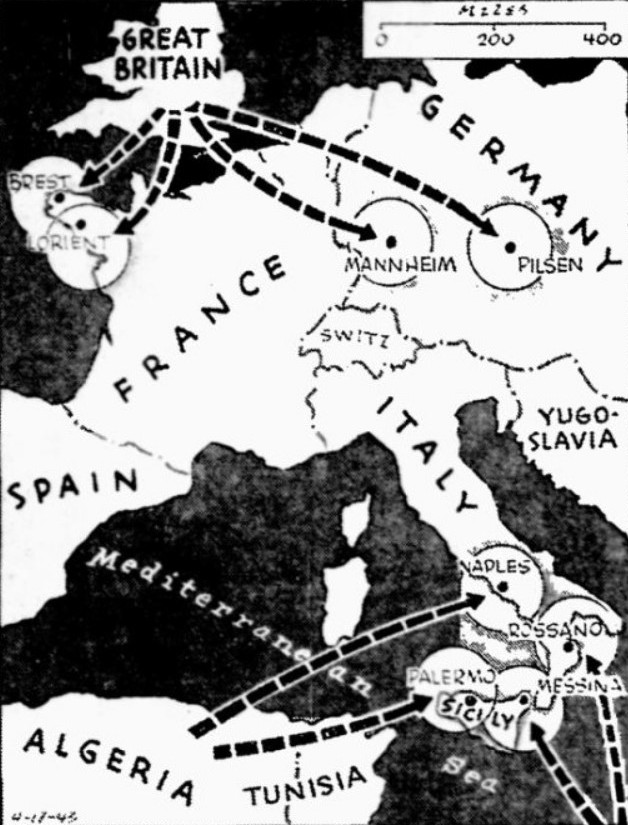
Roving Reporter
In Tunisia –
Little items – Petty’s drawing of his famous girl stretched out on her stomach musing about something is tacked up in hundreds of soldiers’ billets in North Africa.
The German photographic plane that covers every important sector in Tunisia daily is known in the trade as “Photo Freddie” …On days when more than one comes over, the second is called “Freddie Junior.” …Once in a while you can make out the plane as it flashes in the sun, but usually it’s so high you can’t see it at all, you just hear it…
I heard a funny story about a road-strafing the other day. Three soldiers were riding in a jeep when strafers came diving. The soldier in the back seat was riding backwards so he could keep a watch to the rear. The jeep took off across the fields, with the strafers after it. The rear guard kept calling “Right” or “Left” to indicate which way the driver should turn to dodge. But finally, it got too hot for the boys up front, and they just bailed out and left the jeep running. That left our hero alone, riding backwards in a driverless jeep, yelling “Right-Left” to nobody, while the bullets splattered around. Finally, he looked around to see why the driver wasn’t obeying. Then he too hit the dust.
Two smother in sand
In some parts of Tunisia, the sand is soft yellow and moist, and it’s almost a pleasure to dig slit trenches in it, the digging is so easy. But it does save its drawbacks.
I know of two cases where soldiers were sleeping in narrow slit trenches and the loose sand slid in on them without waking them. They were smothered to death.
Our tank warfare has shown two things – that many of our tanks catch fire when badly hit, and that, although the fire is all over the place in a few seconds, the majority of the crews are able to get out safely and struggle back to camp.
In wartime living, you relearn little things you had forgotten years ago. Such things, for example, ass lighting a cigarette simply by putting it over the chimney of a coal-oil lamp and puffing.
Italians are Eyeties, wops, guineas
One day I was up on a mountainside with troops holding a forward outpost. They were in such an inaccessible and perilous place that they were getting just one meal a day, and artillery fire was whining over their heads constantly. Yet, right in the midst of that, a truck arrived at the foot of the mountain, and here came soldiers lugging up sacks of mail. The boys were getting their letters right on the firing line.
You hardly ever hear Italian soldiers referred to as Italians. It’s either “Eyeties” or “Wops” or “Guineas.” In one case, the reason for abandoning “Italian” was a concrete one. In this case, a mountain lookout reported that “three Italians” were coming up the hill. The officer who heard it thought he said “three battalions,” and ordered a heavy barrage dropped in that area.
When the lookout called back to ask why such heavy shooting, the misunderstanding was straightened out. From then on, all men in that outfit were instructed to refer to Italians as “Guineas.”
Bomb blast vulcanizes bills
I saw the tragic remnants of a jeep that got a direct hit from a 500-pound German bomb. Three soldiers in it were blown to disintegration. Nothing was found of them to bury. But searchers did find scattered coins, knives, and bits of clothing. One soldier had a pocket Bible, and about half of its sheets were found.
Another had a large pad of currency – bills just folded over once. And the reason I’m telling this story – those bills were blown together with such force that it was impossible to get them apart. We couldn’t even strip off one bill with a pocketknife. The blast had vulcanized them together without tearing any holes in them.
